Analysis of the Henderson Maxwell Case: Financial Ethics and Advice
VerifiedAdded on 2022/09/15
|7
|1470
|24
Case Study
AI Summary
This case study analyzes the Henderson Maxwell case, where a financial advisor was found to have provided bad advice and engaged in unethical practices. The advisor failed to uphold fiduciary duties, including disclosing conflicts of interest and providing fair and full disclosure to the client. The advisor impersonated the client to obtain financial information and encouraged investment in his own company, leading to potential financial losses for the client. The analysis highlights the ethical principles of care, respect, diligence, fairness, and honesty in financial management and compares ethical conduct with laws and regulations. The document reflects on how a financial advisor could have acted differently by upholding ethical conduct, maintaining transparency, and adhering to professional standards. The analysis also emphasizes the importance of ethical training and strict penalties for unethical behavior within financial institutions.
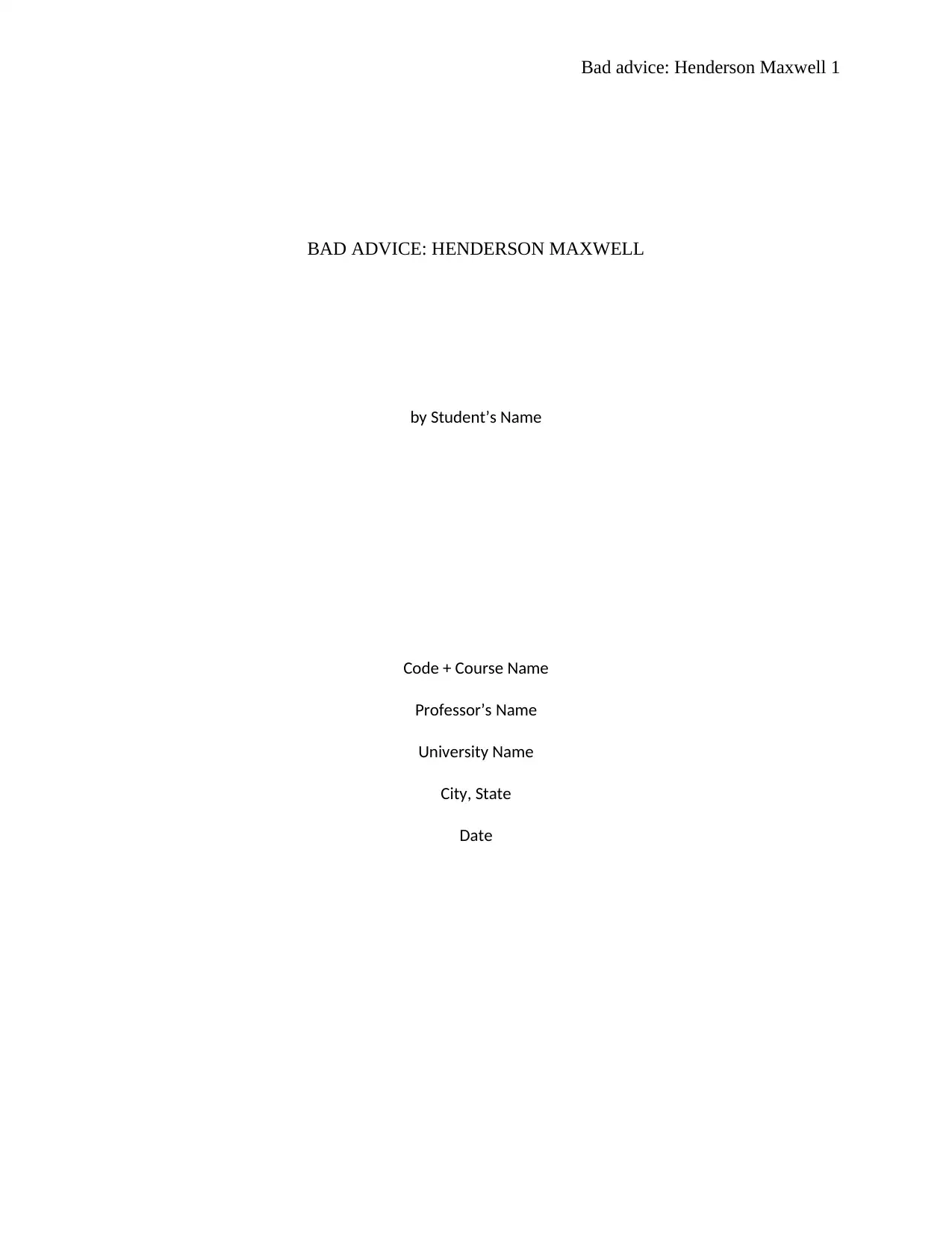
Bad advice: Henderson Maxwell 1
BAD ADVICE: HENDERSON MAXWELL
by Student’s Name
Code + Course Name
Professor’s Name
University Name
City, State
Date
BAD ADVICE: HENDERSON MAXWELL
by Student’s Name
Code + Course Name
Professor’s Name
University Name
City, State
Date
Paraphrase This Document
Need a fresh take? Get an instant paraphrase of this document with our AI Paraphraser
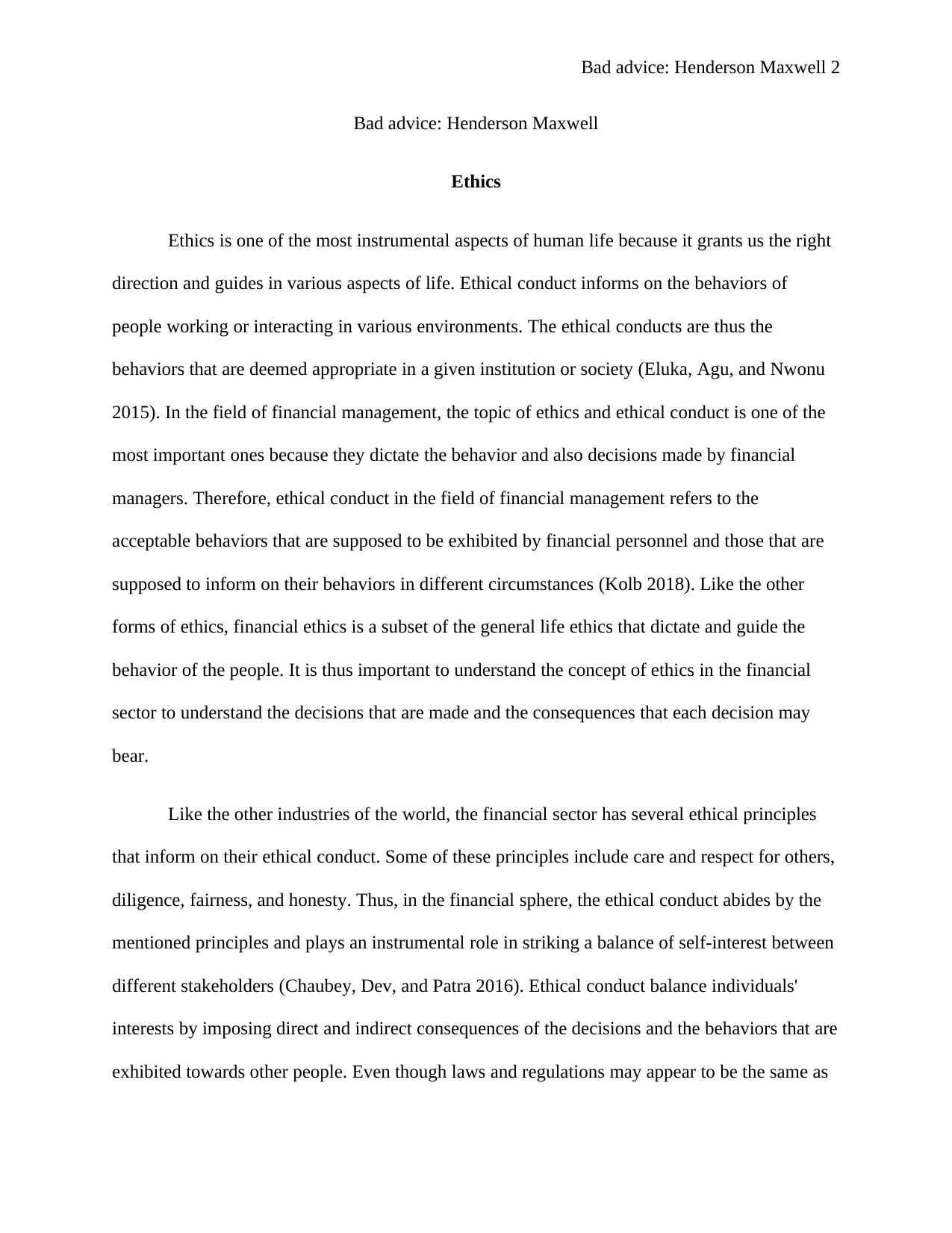
Bad advice: Henderson Maxwell 2
Bad advice: Henderson Maxwell
Ethics
Ethics is one of the most instrumental aspects of human life because it grants us the right
direction and guides in various aspects of life. Ethical conduct informs on the behaviors of
people working or interacting in various environments. The ethical conducts are thus the
behaviors that are deemed appropriate in a given institution or society (Eluka, Agu, and Nwonu
2015). In the field of financial management, the topic of ethics and ethical conduct is one of the
most important ones because they dictate the behavior and also decisions made by financial
managers. Therefore, ethical conduct in the field of financial management refers to the
acceptable behaviors that are supposed to be exhibited by financial personnel and those that are
supposed to inform on their behaviors in different circumstances (Kolb 2018). Like the other
forms of ethics, financial ethics is a subset of the general life ethics that dictate and guide the
behavior of the people. It is thus important to understand the concept of ethics in the financial
sector to understand the decisions that are made and the consequences that each decision may
bear.
Like the other industries of the world, the financial sector has several ethical principles
that inform on their ethical conduct. Some of these principles include care and respect for others,
diligence, fairness, and honesty. Thus, in the financial sphere, the ethical conduct abides by the
mentioned principles and plays an instrumental role in striking a balance of self-interest between
different stakeholders (Chaubey, Dev, and Patra 2016). Ethical conduct balance individuals'
interests by imposing direct and indirect consequences of the decisions and the behaviors that are
exhibited towards other people. Even though laws and regulations may appear to be the same as
Bad advice: Henderson Maxwell
Ethics
Ethics is one of the most instrumental aspects of human life because it grants us the right
direction and guides in various aspects of life. Ethical conduct informs on the behaviors of
people working or interacting in various environments. The ethical conducts are thus the
behaviors that are deemed appropriate in a given institution or society (Eluka, Agu, and Nwonu
2015). In the field of financial management, the topic of ethics and ethical conduct is one of the
most important ones because they dictate the behavior and also decisions made by financial
managers. Therefore, ethical conduct in the field of financial management refers to the
acceptable behaviors that are supposed to be exhibited by financial personnel and those that are
supposed to inform on their behaviors in different circumstances (Kolb 2018). Like the other
forms of ethics, financial ethics is a subset of the general life ethics that dictate and guide the
behavior of the people. It is thus important to understand the concept of ethics in the financial
sector to understand the decisions that are made and the consequences that each decision may
bear.
Like the other industries of the world, the financial sector has several ethical principles
that inform on their ethical conduct. Some of these principles include care and respect for others,
diligence, fairness, and honesty. Thus, in the financial sphere, the ethical conduct abides by the
mentioned principles and plays an instrumental role in striking a balance of self-interest between
different stakeholders (Chaubey, Dev, and Patra 2016). Ethical conduct balance individuals'
interests by imposing direct and indirect consequences of the decisions and the behaviors that are
exhibited towards other people. Even though laws and regulations may appear to be the same as
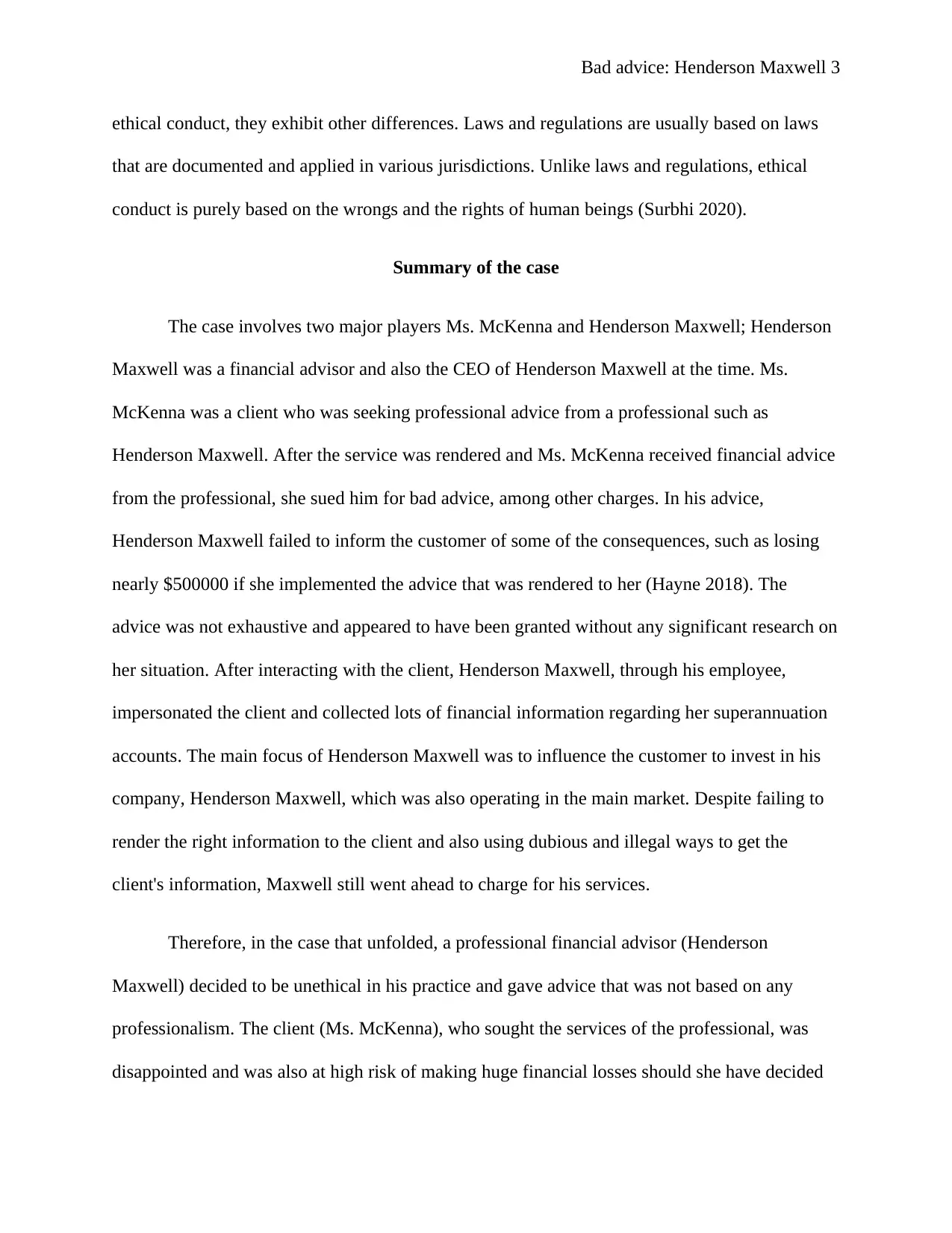
Bad advice: Henderson Maxwell 3
ethical conduct, they exhibit other differences. Laws and regulations are usually based on laws
that are documented and applied in various jurisdictions. Unlike laws and regulations, ethical
conduct is purely based on the wrongs and the rights of human beings (Surbhi 2020).
Summary of the case
The case involves two major players Ms. McKenna and Henderson Maxwell; Henderson
Maxwell was a financial advisor and also the CEO of Henderson Maxwell at the time. Ms.
McKenna was a client who was seeking professional advice from a professional such as
Henderson Maxwell. After the service was rendered and Ms. McKenna received financial advice
from the professional, she sued him for bad advice, among other charges. In his advice,
Henderson Maxwell failed to inform the customer of some of the consequences, such as losing
nearly $500000 if she implemented the advice that was rendered to her (Hayne 2018). The
advice was not exhaustive and appeared to have been granted without any significant research on
her situation. After interacting with the client, Henderson Maxwell, through his employee,
impersonated the client and collected lots of financial information regarding her superannuation
accounts. The main focus of Henderson Maxwell was to influence the customer to invest in his
company, Henderson Maxwell, which was also operating in the main market. Despite failing to
render the right information to the client and also using dubious and illegal ways to get the
client's information, Maxwell still went ahead to charge for his services.
Therefore, in the case that unfolded, a professional financial advisor (Henderson
Maxwell) decided to be unethical in his practice and gave advice that was not based on any
professionalism. The client (Ms. McKenna), who sought the services of the professional, was
disappointed and was also at high risk of making huge financial losses should she have decided
ethical conduct, they exhibit other differences. Laws and regulations are usually based on laws
that are documented and applied in various jurisdictions. Unlike laws and regulations, ethical
conduct is purely based on the wrongs and the rights of human beings (Surbhi 2020).
Summary of the case
The case involves two major players Ms. McKenna and Henderson Maxwell; Henderson
Maxwell was a financial advisor and also the CEO of Henderson Maxwell at the time. Ms.
McKenna was a client who was seeking professional advice from a professional such as
Henderson Maxwell. After the service was rendered and Ms. McKenna received financial advice
from the professional, she sued him for bad advice, among other charges. In his advice,
Henderson Maxwell failed to inform the customer of some of the consequences, such as losing
nearly $500000 if she implemented the advice that was rendered to her (Hayne 2018). The
advice was not exhaustive and appeared to have been granted without any significant research on
her situation. After interacting with the client, Henderson Maxwell, through his employee,
impersonated the client and collected lots of financial information regarding her superannuation
accounts. The main focus of Henderson Maxwell was to influence the customer to invest in his
company, Henderson Maxwell, which was also operating in the main market. Despite failing to
render the right information to the client and also using dubious and illegal ways to get the
client's information, Maxwell still went ahead to charge for his services.
Therefore, in the case that unfolded, a professional financial advisor (Henderson
Maxwell) decided to be unethical in his practice and gave advice that was not based on any
professionalism. The client (Ms. McKenna), who sought the services of the professional, was
disappointed and was also at high risk of making huge financial losses should she have decided
⊘ This is a preview!⊘
Do you want full access?
Subscribe today to unlock all pages.

Trusted by 1+ million students worldwide
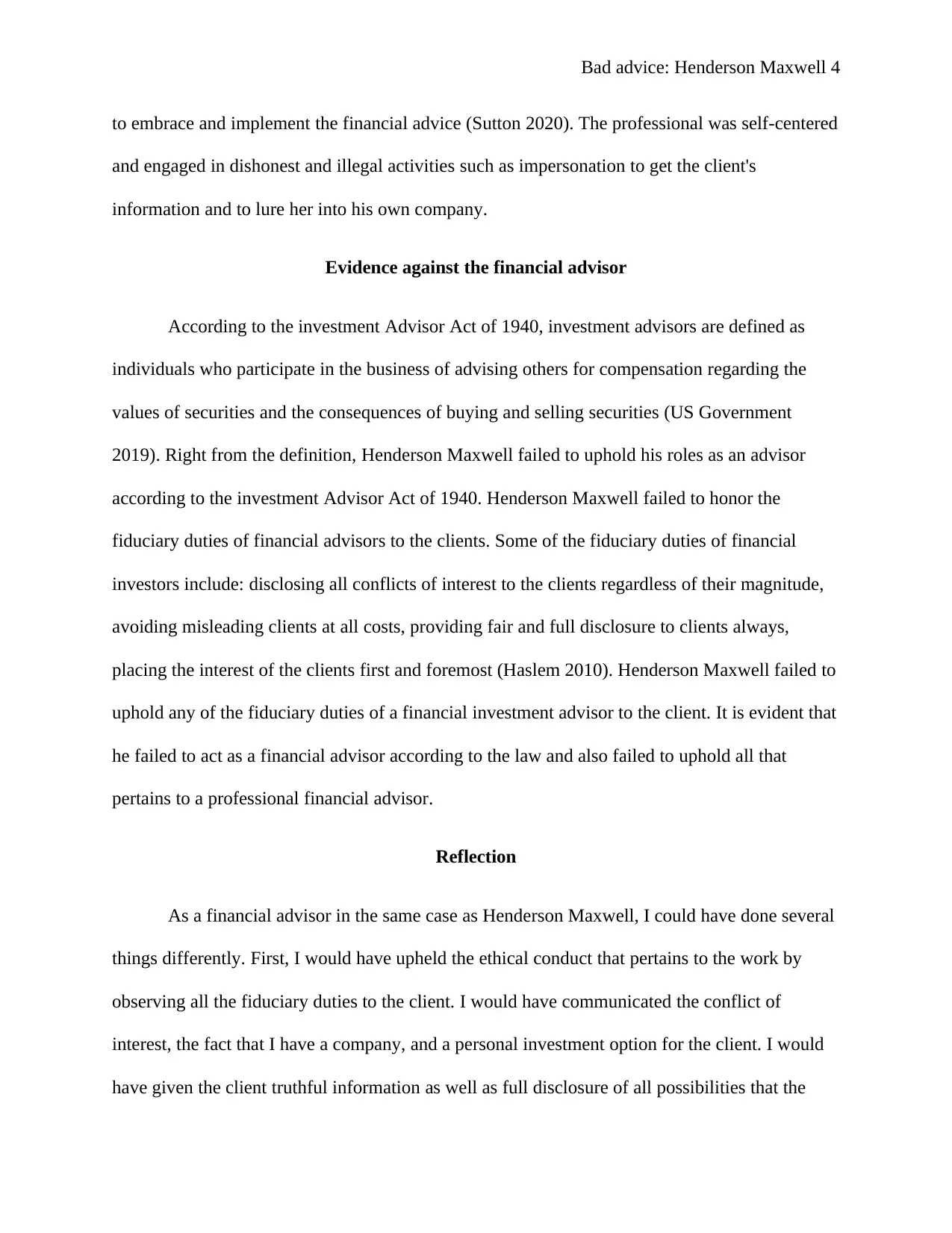
Bad advice: Henderson Maxwell 4
to embrace and implement the financial advice (Sutton 2020). The professional was self-centered
and engaged in dishonest and illegal activities such as impersonation to get the client's
information and to lure her into his own company.
Evidence against the financial advisor
According to the investment Advisor Act of 1940, investment advisors are defined as
individuals who participate in the business of advising others for compensation regarding the
values of securities and the consequences of buying and selling securities (US Government
2019). Right from the definition, Henderson Maxwell failed to uphold his roles as an advisor
according to the investment Advisor Act of 1940. Henderson Maxwell failed to honor the
fiduciary duties of financial advisors to the clients. Some of the fiduciary duties of financial
investors include: disclosing all conflicts of interest to the clients regardless of their magnitude,
avoiding misleading clients at all costs, providing fair and full disclosure to clients always,
placing the interest of the clients first and foremost (Haslem 2010). Henderson Maxwell failed to
uphold any of the fiduciary duties of a financial investment advisor to the client. It is evident that
he failed to act as a financial advisor according to the law and also failed to uphold all that
pertains to a professional financial advisor.
Reflection
As a financial advisor in the same case as Henderson Maxwell, I could have done several
things differently. First, I would have upheld the ethical conduct that pertains to the work by
observing all the fiduciary duties to the client. I would have communicated the conflict of
interest, the fact that I have a company, and a personal investment option for the client. I would
have given the client truthful information as well as full disclosure of all possibilities that the
to embrace and implement the financial advice (Sutton 2020). The professional was self-centered
and engaged in dishonest and illegal activities such as impersonation to get the client's
information and to lure her into his own company.
Evidence against the financial advisor
According to the investment Advisor Act of 1940, investment advisors are defined as
individuals who participate in the business of advising others for compensation regarding the
values of securities and the consequences of buying and selling securities (US Government
2019). Right from the definition, Henderson Maxwell failed to uphold his roles as an advisor
according to the investment Advisor Act of 1940. Henderson Maxwell failed to honor the
fiduciary duties of financial advisors to the clients. Some of the fiduciary duties of financial
investors include: disclosing all conflicts of interest to the clients regardless of their magnitude,
avoiding misleading clients at all costs, providing fair and full disclosure to clients always,
placing the interest of the clients first and foremost (Haslem 2010). Henderson Maxwell failed to
uphold any of the fiduciary duties of a financial investment advisor to the client. It is evident that
he failed to act as a financial advisor according to the law and also failed to uphold all that
pertains to a professional financial advisor.
Reflection
As a financial advisor in the same case as Henderson Maxwell, I could have done several
things differently. First, I would have upheld the ethical conduct that pertains to the work by
observing all the fiduciary duties to the client. I would have communicated the conflict of
interest, the fact that I have a company, and a personal investment option for the client. I would
have given the client truthful information as well as full disclosure of all possibilities that the
Paraphrase This Document
Need a fresh take? Get an instant paraphrase of this document with our AI Paraphraser
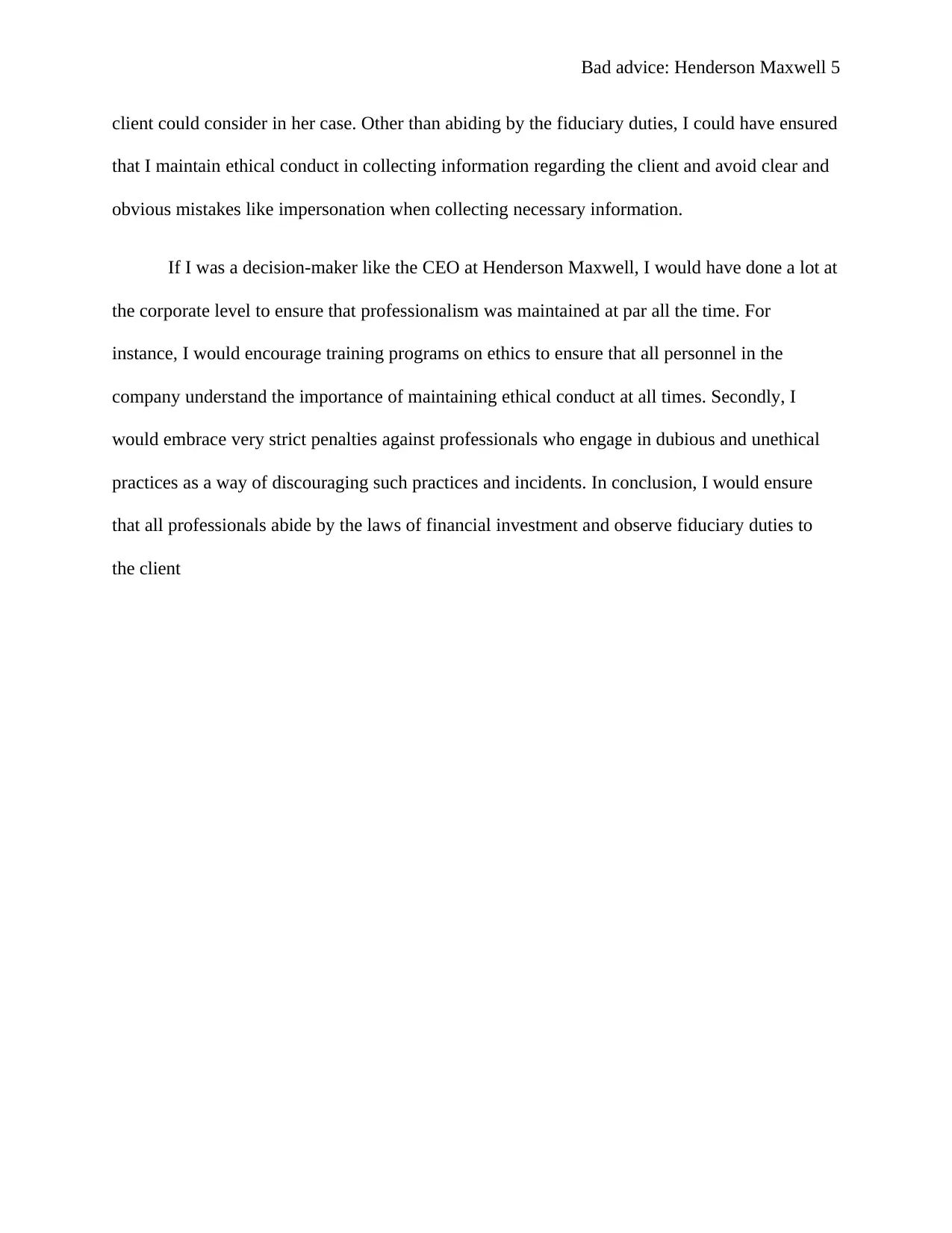
Bad advice: Henderson Maxwell 5
client could consider in her case. Other than abiding by the fiduciary duties, I could have ensured
that I maintain ethical conduct in collecting information regarding the client and avoid clear and
obvious mistakes like impersonation when collecting necessary information.
If I was a decision-maker like the CEO at Henderson Maxwell, I would have done a lot at
the corporate level to ensure that professionalism was maintained at par all the time. For
instance, I would encourage training programs on ethics to ensure that all personnel in the
company understand the importance of maintaining ethical conduct at all times. Secondly, I
would embrace very strict penalties against professionals who engage in dubious and unethical
practices as a way of discouraging such practices and incidents. In conclusion, I would ensure
that all professionals abide by the laws of financial investment and observe fiduciary duties to
the client
client could consider in her case. Other than abiding by the fiduciary duties, I could have ensured
that I maintain ethical conduct in collecting information regarding the client and avoid clear and
obvious mistakes like impersonation when collecting necessary information.
If I was a decision-maker like the CEO at Henderson Maxwell, I would have done a lot at
the corporate level to ensure that professionalism was maintained at par all the time. For
instance, I would encourage training programs on ethics to ensure that all personnel in the
company understand the importance of maintaining ethical conduct at all times. Secondly, I
would embrace very strict penalties against professionals who engage in dubious and unethical
practices as a way of discouraging such practices and incidents. In conclusion, I would ensure
that all professionals abide by the laws of financial investment and observe fiduciary duties to
the client
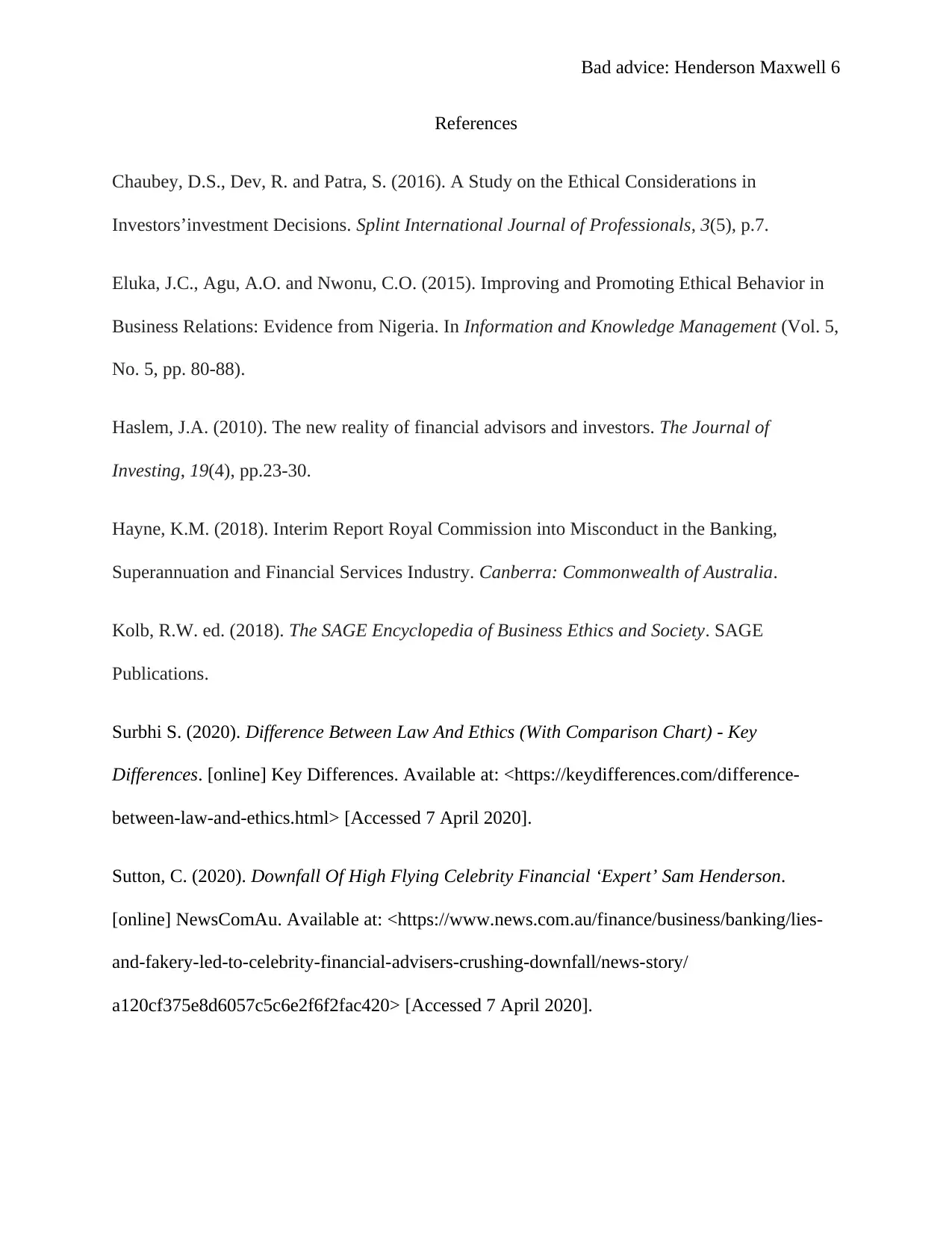
Bad advice: Henderson Maxwell 6
References
Chaubey, D.S., Dev, R. and Patra, S. (2016). A Study on the Ethical Considerations in
Investors’investment Decisions. Splint International Journal of Professionals, 3(5), p.7.
Eluka, J.C., Agu, A.O. and Nwonu, C.O. (2015). Improving and Promoting Ethical Behavior in
Business Relations: Evidence from Nigeria. In Information and Knowledge Management (Vol. 5,
No. 5, pp. 80-88).
Haslem, J.A. (2010). The new reality of financial advisors and investors. The Journal of
Investing, 19(4), pp.23-30.
Hayne, K.M. (2018). Interim Report Royal Commission into Misconduct in the Banking,
Superannuation and Financial Services Industry. Canberra: Commonwealth of Australia.
Kolb, R.W. ed. (2018). The SAGE Encyclopedia of Business Ethics and Society. SAGE
Publications.
Surbhi S. (2020). Difference Between Law And Ethics (With Comparison Chart) - Key
Differences. [online] Key Differences. Available at: <https://keydifferences.com/difference-
between-law-and-ethics.html> [Accessed 7 April 2020].
Sutton, C. (2020). Downfall Of High Flying Celebrity Financial ‘Expert’ Sam Henderson.
[online] NewsComAu. Available at: <https://www.news.com.au/finance/business/banking/lies-
and-fakery-led-to-celebrity-financial-advisers-crushing-downfall/news-story/
a120cf375e8d6057c5c6e2f6f2fac420> [Accessed 7 April 2020].
References
Chaubey, D.S., Dev, R. and Patra, S. (2016). A Study on the Ethical Considerations in
Investors’investment Decisions. Splint International Journal of Professionals, 3(5), p.7.
Eluka, J.C., Agu, A.O. and Nwonu, C.O. (2015). Improving and Promoting Ethical Behavior in
Business Relations: Evidence from Nigeria. In Information and Knowledge Management (Vol. 5,
No. 5, pp. 80-88).
Haslem, J.A. (2010). The new reality of financial advisors and investors. The Journal of
Investing, 19(4), pp.23-30.
Hayne, K.M. (2018). Interim Report Royal Commission into Misconduct in the Banking,
Superannuation and Financial Services Industry. Canberra: Commonwealth of Australia.
Kolb, R.W. ed. (2018). The SAGE Encyclopedia of Business Ethics and Society. SAGE
Publications.
Surbhi S. (2020). Difference Between Law And Ethics (With Comparison Chart) - Key
Differences. [online] Key Differences. Available at: <https://keydifferences.com/difference-
between-law-and-ethics.html> [Accessed 7 April 2020].
Sutton, C. (2020). Downfall Of High Flying Celebrity Financial ‘Expert’ Sam Henderson.
[online] NewsComAu. Available at: <https://www.news.com.au/finance/business/banking/lies-
and-fakery-led-to-celebrity-financial-advisers-crushing-downfall/news-story/
a120cf375e8d6057c5c6e2f6f2fac420> [Accessed 7 April 2020].
⊘ This is a preview!⊘
Do you want full access?
Subscribe today to unlock all pages.

Trusted by 1+ million students worldwide
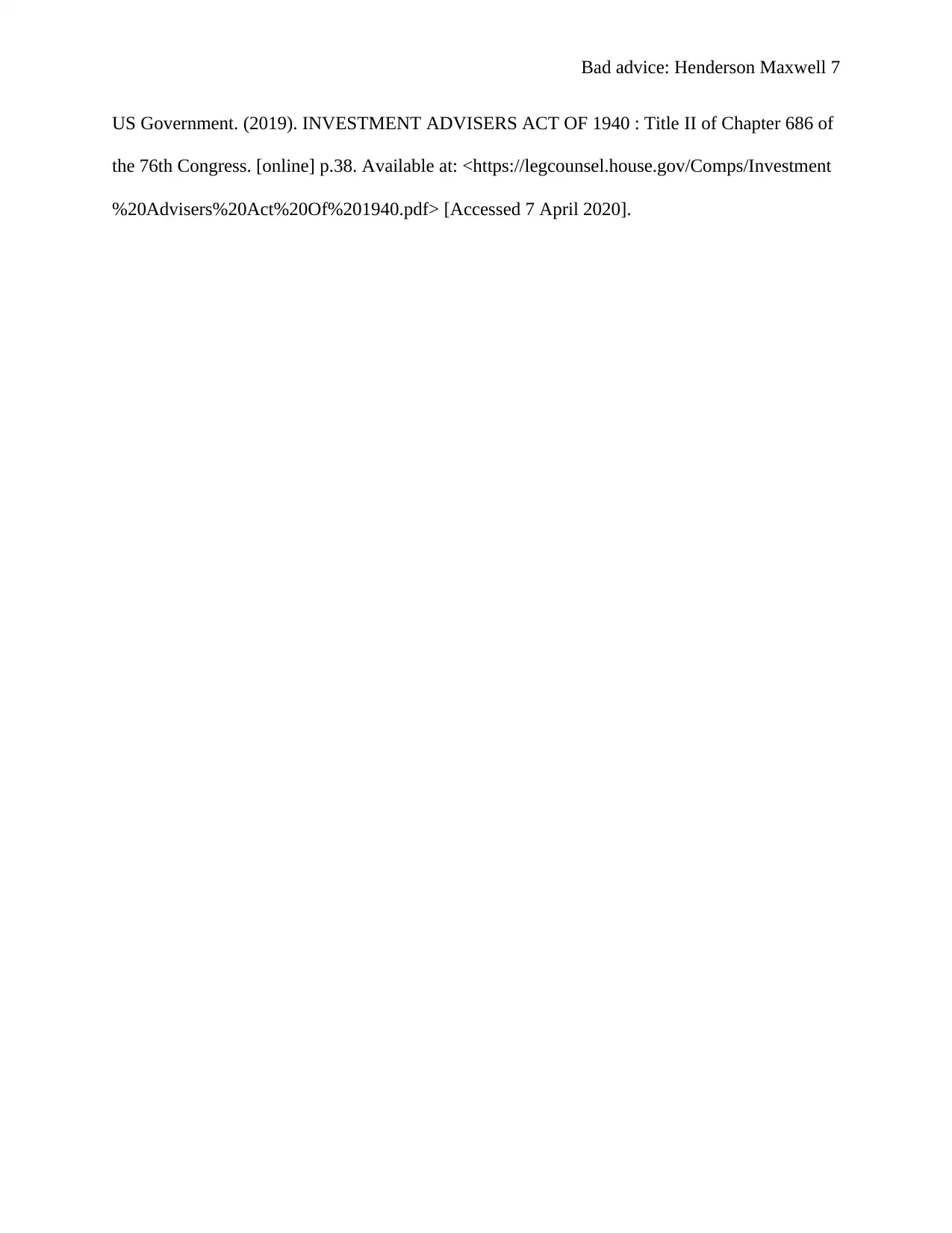
Bad advice: Henderson Maxwell 7
US Government. (2019). INVESTMENT ADVISERS ACT OF 1940 : Title II of Chapter 686 of
the 76th Congress. [online] p.38. Available at: <https://legcounsel.house.gov/Comps/Investment
%20Advisers%20Act%20Of%201940.pdf> [Accessed 7 April 2020].
US Government. (2019). INVESTMENT ADVISERS ACT OF 1940 : Title II of Chapter 686 of
the 76th Congress. [online] p.38. Available at: <https://legcounsel.house.gov/Comps/Investment
%20Advisers%20Act%20Of%201940.pdf> [Accessed 7 April 2020].
1 out of 7
Your All-in-One AI-Powered Toolkit for Academic Success.
+13062052269
info@desklib.com
Available 24*7 on WhatsApp / Email
![[object Object]](/_next/static/media/star-bottom.7253800d.svg)
Unlock your academic potential
Copyright © 2020–2026 A2Z Services. All Rights Reserved. Developed and managed by ZUCOL.


